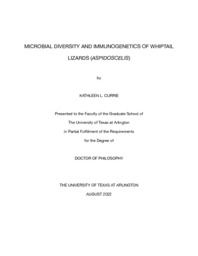
ATTENTION: The works hosted here are being migrated to a new repository that will consolidate resources, improve discoverability, and better show UTA's research impact on the global community. We will update authors as the migration progresses. Please see MavMatrix for more information.
Show simple item record
| dc.contributor.advisor | Fujita, Matthew K. | |
| dc.creator | Currie, Kathleen | |
| dc.date.accessioned | 2023-06-28T20:26:50Z | |
| dc.date.available | 2023-06-28T20:26:50Z | |
| dc.date.created | 2022-08 | |
| dc.date.issued | 2022-08-10 | |
| dc.date.submitted | August 2022 | |
| dc.identifier.uri | http://hdl.handle.net/10106/31422 | |
| dc.description.abstract | Whiptail lizards of the genus Aspidoscelis are a complex of both sexual and asexual species with distributions in the United States, Mexico, and Central America. The parthenogenetic lineages arose through hybridization events between divergent sexual species; further backcrossing of the diploid parthenogens to the parentals is possible, and even hybridization with a third species produce triploid lineages. Here, we leverage the unique biology of whiptail lizards to evaluate and compare gut microbial communities between reproductive modes, investigate whether host genetic variation correlates with microbial diversity, and characterize MHC class II beta genes. | |
| dc.format.mimetype | application/pdf | |
| dc.language.iso | en_US | |
| dc.subject | Microbiome | |
| dc.subject | MHC | |
| dc.subject | Parthenogenesis | |
| dc.subject | Reptile | |
| dc.subject | Teiidae | |
| dc.title | Microbial Diversity and Immunogenetics of Whiptail Lizards (Aspidoscelis) | |
| dc.type | Thesis | |
| dc.date.updated | 2023-06-28T20:26:50Z | |
| thesis.degree.department | Biology | |
| thesis.degree.grantor | The University of Texas at Arlington | |
| thesis.degree.level | Doctoral | |
| thesis.degree.name | Doctor of Philosophy in Quantative Biology | |
| dc.type.material | text | |
| dc.creator.orcid | 0000-0003-4350-6338 | |
| local.embargo.terms | 2023-08-01 | |
| local.embargo.lift | 2023-08-01 | |
Files in this item
- Name:
- CURRIE-DISSERTATION-2022.pdf
- Size:
- 6.556Mb
- Format:
- PDF
This item appears in the following Collection(s)
Show simple item record


